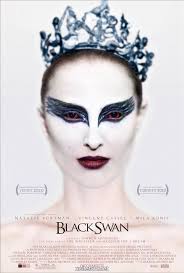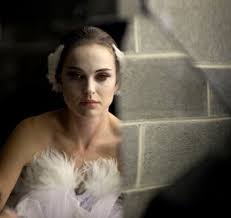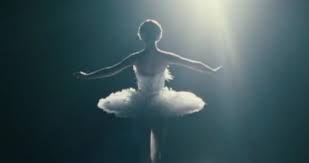The ballet, despite its reputation for grace, elegance, and sophistication, is really a very primal art form. Emotions and ideas are expressed not in images on a canvas or in two people acting and reacting to each other verbally, but through the movements of the human body. The ballerinas who perform these acts have to be in peak physical shape, and every motion, every look, has to convey emotion rawly. That's the awesome power of dance: its the most engaging, exciting, and, well, real expression of emotion and of self there is. Dance is the ultimate unleashing of one's self, letting go to instinct rather than control.





This, of course, is one of the themes of Black Swan, Darren Aronofsky's brilliant new film. The film is about Nina Sayers (Natalie Portman), a ballerina who lands the plumb dual role of the White Swan and the Black Swan in a production of Swan Lake. Her director, Thomas (Vincent Cassel), thinks she's perfect for the White Swan, but needs to let go mentally and sexually in order to better portray the Black Swan. Another ballerina, Lily (Mila Kunis), more embodies the Black Swan, and Nina worries that she'll be replaced. Nina's mom (Barbara Hershey) is a former ballerina, and in her own completely overbearing way is edging Nina on to practice and secure the role. But Nina's starting to break down from everything, leading to...I won't spoil it any further.
Do not, by any circumstances, be fooled into thinking this is the "psychological/psychosexual thriller" that the film has been marketed as. This isn't a polite ballerina drama with some rough edges. This is a HORROR film. Unfortunately, "horror" is such a stigmatized term nowadays, as most modern horror films are made up of either cheap scares or one set-piece trying to out-gross the one before it (here's looking at you, Saw). These are horror films, yes, but there's nothing truly scary about them; whatever fear you had, or whatever effect the film had, disappears as soon as the lights come on. Black Swan, however, is a perfect example of a true horror film, the kind of film that every horror movie should be. Nina's possible mental breakdown consumes the entire film, and thanks to Aronofsky's bold direction and cinematographer Matthew Libatique's gorgeous, unsettling hand-held camerawork, that breakdown creeps into the audience as well. The film constantly questions what is real, making for a rewarding (though thoroughly disturbing) experience, if you're willing to take that descent into madness. Nina's transformation from uptight, "good" girl to an unrestrained "bad" girl, from White Swan to Black Swan, presents the most basic and effective horror device in the film: there are no monsters coming to get us, because WE are the monsters, the untapped potential within us. And in the process, Black Swan accomplishes what other great horror films such as The Exorcist or The Silence of the Lambs did: the cuts you to the core, and stays there, like a nightmare you can't shake, no matter how hard you try.
I've long been a fan of Darren Aronofsky's films. My first was The Fountain, a film that's terribly underrated, and afterwards I explored the dark depths of Pi, Requiem for a Dream, and The Wrestler. And there is one theme that runs through Aronofsky's filmography: obsession, particularly obsession to the point of self-destruction. Black Swan is no exception to this. And Aronofsky does an amazing job creating a visual language that makes the film so effective. He uses mirrors as a way of reflecting on the character, as there are mirrors in almost every location in the film. Throughout the film, Nina (the White Swan) is usually in light colors, whereas Lily (the Black Swan; she could also be Nina's repressed female id, in a Freudian perspective) is in dark colors. And then there's the way he highlights the violence of ballet, not just mental but also physical: close-ups of toe-points, back muscles contorting into various positions, the way the body is punished through these motions. All of these things only add to the disturbing horror of the film, and it just further shows the brilliance of Aronofsky.
Notice the color scheme
As for performances, the cast could not be better. Portman is a revelation, finally making good on the promise she's shown in the past. She's never been better than this, and the way she portrays Nina's collapse is nothing short of breathtaking. Aronofsky has brought out the best in her, and hopefully the two will team up again sometime. Cassel makes for a wonderful pervy director, making good use of his unconventional good looks and charisma. Hershey has a terrific role as Nina's monster mom, and she plays it with just the right amount of over-the-top theatricality that chills the bone. I never thought I'd say this, because I absolutely despise That '70s Show, but Kunis is extraordinary; like Portman, maybe she just needs the right roles and right directors to shine. And Winona Ryder makes the most of her five minutes of screentime with a terrific performance as a forced-to-retire ballerina, getting one of the films most visually disturbing scenes.
I want to reiterate that this is indeed a horror film, and not the typical kind; this film is legitimately disturbing, and I don't recommend it to anyone that's squeamish. But it is one of, if not the, best film of the year, and if you're willing to give it a try, by all means do. Its a one-of-a-kind experience.
Comments
As for the visuals of this film, I can't wait to get my mitts on a dvd copy so I can see how Aronofsky and Co. handled all of those mirrors.
Great posts - one of the year's best films to be sure!
Mad Hatter - I didn't even notice that until you pointed it out. Hmmm I think I'll have to check it out again as well....